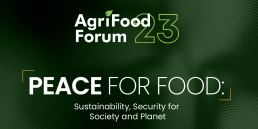Vilnius will soon once again become a platform for thoughtful solutions to address the complex challenges facing the planet in the long term and develop global partnerships that enable more effective and innovative transformation. The annual International AgriFood Forum 2023 is back on November 14. The largest event of its kind in the Baltics brings together political, business, and academic leaders from all over the world, and this year’s participants include European Commissioner for Agriculture Janusz Wojciechowski. The event is available to attend for free and will be streamed online by registering on the official website www.digitalfarm.lt.
The forum on the theme “Peace for Food: Sustainability, Security for Society, and Planet” is organized by the AgriFood Lithuania cluster and digital innovation hub and the European Parliament, in cooperation with “Business at OECD” and the Lithuanian Confederation of Industrialists.
In line with the mission of an impactful organization
The previous forum attracted more than 2,500 online listeners. This year, an even larger audience is expected due to the wide range of topics covered, and the event will bring together up to 200 guests live at Vilnius Town Hall.
Other major international events around the same date as the AgriFood Forum 2023 will provide even more opportunities to exchange important insights. On the day before the forum, the official meeting of the “Business at OECD” Food and Agriculture Committee will take place at the Palace of the Grand Dukes of Lithuania for the first time. Usually, such meetings are held at the organization’s headquarters in Paris.
On November 14-15, a unique coworking space for the interactive “C2Lab” workshop, initiated by the European Clusters Alliance, will be set up. Organizations from different industry clusters, companies, and research institutions from all over Europe will come together in consortia to develop business ideas.
“Business at OECD” is an international business group that has formally represented the private sector in all aspects of OECD policy-making for more than 60 years. Simply put, it is a partner in major decisions, facilitating the dialogue between business and government toward a growth-oriented, prosperous, and inclusive future.
The forum concept, launched last year, is further developed through one of the organization’s global initiatives, “Peace for Food”. It highlights the commitment of business to the global goals of agricultural sustainability and innovation, invites countries to focus on current food markets and their challenges, and supports companies that have the ambition to engage proactively in the OECD’s work on agriculture.
The Commissioner for Agriculture will open the forum
Since 2019, the event has been characterized by outstanding visits from speakers and panelists, including high-level government officials, representatives of agriculture and/or food and other businesses and clusters, academics, and agri-food value chain stakeholders at international and national levels.
The 5th AgriFood Forum, whose detailed programme and list of speakers are available on the above-mentioned official website, will have a very special guest. In addition to the Speaker of the Seimas, Viktorija Čmilytė-Nielsen, and the Minister for the Environment, Simonas Gentvilas, the forum will be opened by the European Commissioner for Agriculture, Janusz Wojciechowski.
The EC representative’s vision for the future of the sector aligns with the main topics to be addressed at the AgriFood Forum 2023, starting with modernization and sustainable agriculture that can adapt to climate, demographic, and technological challenges. Mr. Wojciechowski’s priorities include contributing to the implementation of the Field-to-Table approach for sustainable, healthy, quality food, promoting cooperation between Member States in the development of strategic plans reflecting EU and national priorities, focusing on regional areas, organic farming, zero pollution, etc.
Networks hold the golden key to transformation
Reflecting on the importance of the forum’s continuity in addressing complex food system crises and finding the tools needed to tackle them, the organizers also recall a key message that has been encoded in many of the AgriFood Forum 2022’s speeches and panel discussions.
Today, the power to change the world by initiating and implementing change lies in networks based on close partnerships: clusters, digital innovation hubs, business initiatives, large corporations, and other cores of the agri-food system that are threatened by the same sectoral problems. However, despite the differences between countries and even continents, they share a common “enemy”: the pollution of the planet, the shrinking of food chains, or the lack of regional development and investment in small and medium-sized businesses.
Thus, last year’s consensus led to an even stronger commitment, not only to maintain but also to continuously reinforce the capacity of a powerful network made up of smaller ones. This year’s forum community is ready to demonstrate the results of the agreement. Global organizations such as the European Clusters Alliance, which brings together more than 900 clusters, and “Business at OECD” will continue to tackle the turbulence of recent times, including COVID-19, geopolitical shocks, and extreme climate change.
It is worth mentioning some of the other important networks that will provide insights at AgriFood Forum 2023: the pan-European consortium EIT Food, which promotes entrepreneurship and innovation in the food sector; Smart Sensors 4 Agri-food, which is supporting agri-food companies on their digitalization journey based on the expertise of more than 40 partners in different regions and countries; the Global Dairy Platform; and the International Seed Federation.
A future secured as a result of today’s joint efforts
Vidmantas Janulevičius, President of the Lithuanian Confederation of Industrialists, points out that the EU is not merely identifying the agri-food sector as one of the 14 industrial ecosystems that have a special role to play in the ongoing transformation. According to the expert, it is a powerful industry that contributes not only to national GDP but also to European and global growth.
One of the forum’s speakers highlights the importance of cooperation in achieving the desired outcomes by saying: “Beyond the financial indicators, the agri-food industry undoubtedly contributes to vital aspects of social stability and global health. To achieve such a model for a sustainable future, it is time to build clear policies based on research findings and to consult the industry to realize more value-added solutions. From innovations that fundamentally change farming practices to more efficient, greener production processes and energy independence as recommended by the EU”.
Augustas Alešiūnas, AgTech business angel and founder of the agri-food innovation house ART21, who participated in the very first AgriFood Forum, echoes the insight about the positive transformation of the event that has become a tradition.
“Increasingly constructive, pragmatic discussions between key opinion makers in the sector are opening up a global perspective on the planet’s values, the fragility of which is largely the responsibility of us—humanity. I am delighted that each year we take a deeper and broader look at the event, covering land, forests, water resources, biodiversity, the interconnections between food systems and public health, and more. It seems that policymaking for the future is no longer a buzzword but a roadmap of real and achievable actions on how we should change our behavior and what concrete choices we should make to maximize the benefits for the planet,” the expert comments.




